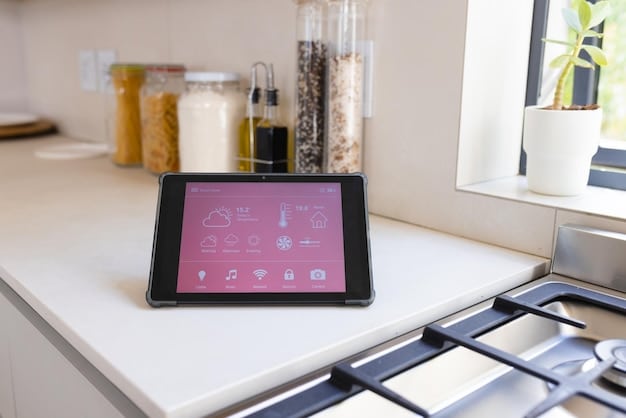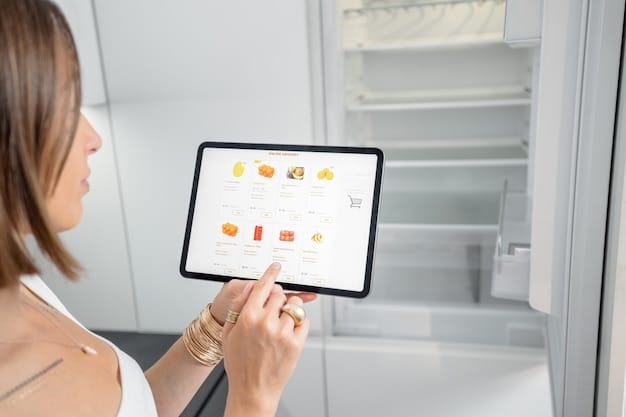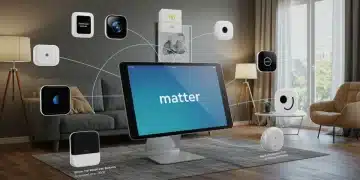Smart Kitchen Appliances: Worth the Investment? Reviews & Guide

Smart kitchen appliances offer convenience and efficiency, but their high cost raises the question: Are they worth the investment? This review explores smart ovens, refrigerators, and other devices to help you decide.
Are you considering upgrading your kitchen with the latest smart appliances? The allure of remotely controlled ovens, refrigerators that track groceries, and voice-activated coffee makers is strong. But are these smart kitchen appliances: Are They Worth the Investment? A Review of Smart Ovens, Refrigerators, and More really worth the hefty price tag?
Understanding Smart Kitchen Appliances
Smart kitchen appliances are more than just gadgets; they’re designed to integrate seamlessly into your life, offering features that promise to save time, money, and effort. But before you rush to replace everything in your kitchen, it’s essential to understand what these appliances actually offer and how they deliver on their smart promises.
What Defines a “Smart” Appliance?
A “smart” appliance typically includes connectivity features like Wi-Fi or Bluetooth, allowing it to communicate with other devices or be controlled remotely via a smartphone app or voice assistant. This connectivity enables a range of functionalities, from remote preheating and temperature adjustments to inventory tracking and automatic reordering of supplies.
Common Features in Smart Appliances
Many smart appliances come equipped with sensors, cameras, and advanced algorithms that help optimize their performance. For example, a smart oven might use a built-in camera to monitor cooking progress, automatically adjusting temperature and cooking time to ensure a perfectly cooked meal. Similarly, a smart refrigerator could scan the barcodes of groceries as you put them away, tracking expiration dates and alerting you when it’s time to restock.
- Remote control via smartphone apps
- Voice command compatibility (e.g., Alexa, Google Assistant)
- Automated functions based on sensors and algorithms
- Integration with other smart home devices
Ultimately, the goal of smart kitchen appliances is to simplify your life by automating routine tasks and providing real-time information about your food and cooking processes. The real question is whether these features justify the higher cost compared to traditional appliances.

Smart Ovens: A Culinary Revolution or Overkill?
Smart ovens represent a paradigm shift in cooking, bringing connectivity and advanced features to your culinary space. These ovens promise precision, convenience, and a level of control that traditional ovens simply can’t match. But do they live up to the hype, or are they just another expensive gadget with limited practical value?
Features of Smart Ovens
Smart ovens come packed with features designed to elevate your cooking experience. Many models include built-in cameras that allow you to monitor your food’s progress remotely via your smartphone. Some can even detect the type of food you’re cooking and automatically adjust temperature and cooking time for optimal results.
Pros and Cons of Smart Ovens
The benefits of smart ovens are clear: precision cooking, remote monitoring, and convenience. However, the high cost can be a significant barrier for many consumers. Additionally, some users may find the advanced features overwhelming or unnecessary for everyday cooking tasks.
- Pros: Precise temperature control, remote monitoring, automated cooking programs
- Cons: High price point, potential complexity for simple cooking, reliance on connectivity
- Consideration: Software updates and app compatibility over time
For serious cooks who demand precision and convenience, a smart oven may be a worthwhile investment. However, for those who primarily cook simple meals, a traditional oven may suffice. It’s important to weigh the benefits against the cost and consider your individual cooking needs and preferences.
Smart Refrigerators: Are They Worth the Hype?
Smart refrigerators are among the most talked-about smart kitchen appliances, promising to revolutionize how we manage our groceries and meal planning. Featuring built-in touchscreens, internal cameras, and connectivity features, these refrigerators offer a range of functionalities aimed at simplifying your life. But are they truly a game-changer, or just an expensive novelty?
Key Features of Smart Refrigerators
The core of a smart refrigerator lies in its ability to manage and track your food inventory. Internal cameras allow you to remotely view the contents of your fridge via your smartphone, helping you avoid unnecessary trips to the grocery store. Many models also include barcode scanners that automatically track expiration dates and send alerts when items are about to expire.
Real-World Benefits and Drawbacks
The potential benefits of a smart refrigerator are compelling. Imagine never again throwing away spoiled food or forgetting to buy an essential ingredient. However, the high cost and potential privacy concerns are significant drawbacks. Additionally, some users may find the features gimmicky or unreliable, especially if the barcode scanning system isn’t accurate.
- Pros: Food inventory management, remote viewing, expiration date tracking, meal planning assistance
- Cons: High cost, potential privacy concerns, reliance on technology, potential for system errors
- Consideration: Integration with other smart home systems
Whether a smart refrigerator is worth the investment depends on your personal needs and priorities. If you frequently waste food or struggle to keep track of your grocery inventory, a smart refrigerator may provide a valuable solution. However, if you’re budget-conscious or concerned about privacy, a traditional refrigerator may be a more sensible choice.
Smart Dishwashers and Microwaves: Convenience at a Cost?
Beyond ovens and refrigerators, smart technology has also found its way into dishwashers and microwaves. These appliances offer added convenience and features, but it’s important to assess whether the benefits outweigh the costs. Let’s explore the smart features of dishwashers and microwaves and determine if the upgrade makes sense for your kitchen.
Smart Dishwashers: Features and Benefits
Smart dishwashers come equipped with features such as Wi-Fi connectivity, allowing you to start, stop, and monitor your dishwasher remotely via a smartphone app. Some models can also detect the soil level of your dishes and automatically adjust the wash cycle for optimal cleaning. Additionally, smart dishwashers can provide notifications when the cycle is complete or when the dishwasher needs maintenance.
Smart Microwaves: Enhanced Cooking Options
Smart microwaves offer features like voice control, allowing you to start and stop the microwave or adjust the cooking time using voice commands. Some models also have built-in sensors that detect the food’s moisture level and automatically adjust the cooking time and power level for optimal results. Additionally, you can often use a smartphone app to scan the barcode of a food item, and the microwave will automatically set the correct cooking parameters.
- Pros: Remote control, automatic adjustments, maintenance alerts
- Cons: Incremental convenience for common tasks, potential reliability issues, integration challenges
- Consideration: Frequency of use and willingness to engage with features
Smart dishwashers and microwaves can add a layer of convenience to your kitchen routine, but they’re not essential for most users. If you’re a tech enthusiast who enjoys the latest gadgets, the upgrade may be worth it. However, for those who prioritize simplicity and cost-effectiveness, traditional models will likely suffice.

The Smart Kitchen Ecosystem: Integration and Compatibility
One of the key advantages of smart kitchen appliances is their ability to integrate with other smart home devices and systems. This integration creates a seamless ecosystem that can automate tasks, enhance convenience, and even save energy. However, ensuring compatibility between different devices and platforms is crucial to realizing the full potential of a smart kitchen.
Connecting Your Smart Appliances
Most smart appliances connect to your home Wi-Fi network, allowing them to communicate with each other and with your smartphone or tablet. This connectivity enables you to control your appliances remotely, monitor their status, and receive notifications. It also allows them to integrate with voice assistants like Amazon Alexa or Google Assistant, enabling hands-free control.
Compatibility Challenges and Solutions
A smart home ecosystem relies on connectivity, but that can also introduce challenges with compatibility. Not all smart appliances work seamlessly together; you need to check that appliances support common platforms or communication protocols like Apple HomeKit or Zigbee. Investing in products from the same brand can ensure compatibility and simplify the setup process.
- Importance of a Unified Platform: Simplifies control and automation
- Addressing Compatibility Issues: Investigating shared connectivity standards for simpler setups
- Exploring Integration Possibilities: Creating routines that enhance kitchen efficiency
The integration of smart kitchen appliances into a broader smart home ecosystem offers many benefits. By carefully considering compatibility and choosing appliances that work well together, you can create a truly connected and automated kitchen that simplifies your life and enhances your cooking experience.
Making the Decision: Is a Smart Kitchen Right for You?
Investing in smart kitchen appliances is a significant decision that requires careful consideration of your needs, budget, and technological inclinations. While the allure of enhanced convenience, automation, and advanced features is strong, it’s essential to weigh the pros and cons before taking the plunge. When it comes to making informed decisions, considering energy efficiency and overall longevity are key.
Assessing Your Needs and Priorities
Start by evaluating how you currently use your kitchen and what tasks you find most time-consuming or frustrating. Are you constantly running out of ingredients? Do you struggle with precise cooking times and temperatures? Do you value remote control and monitoring capabilities? Answering these questions will help you identify which smart features would be most beneficial to you.
Budget Considerations
Smart appliances typically come with a higher price tag than their traditional counterparts. Set a budget and stick to it. Also, remember to consider the lifespan of these appliances and the availability of future software updates.
| Key Point | Brief Description |
|---|---|
| 💡 Smart Ovens | Offer precise control & remote monitoring for cooking perfection. |
| 🧊 Smart Fridges | Help manage inventory and reduce food waste with internal cameras. |
| 🍽️ Smart Dishwashers | Optimize cleaning cycles remotely, saving time and energy. |
| 🔗 Integration | Seamlessly integrate with other smart home devices for a unified experience. |
Frequently Asked Questions
▼
Smart kitchen appliances offer enhanced convenience, automation, and precision in cooking, food management, and cleaning. They can also help reduce food waste and save energy.
▼
The setup process varies by brand and appliance. Most smart appliances come with detailed instructions and user-friendly apps that guide you through the process. Some may require professional installation.
▼
Yes, most smart appliances require a stable internet connection to function properly and provide remote control and monitoring capabilities. But base functions are always available as a typical dumb appliance.
▼
If the smart features stop working, the appliance will still function as a traditional appliance. However, you will lose access to remote control, monitoring, and automated features.
▼
Many smart appliances are designed with energy-saving features, such as automated shut-off, optimized cycles, and energy-monitoring capabilities. However, energy consumption varies by model and usage patterns.
Conclusion
Ultimately, the decision of whether to invest in smart kitchen appliances depends on your individual needs, preferences, and budget. While these appliances offer a range of compelling features and benefits, they also come with a higher price tag and potential drawbacks. Consider your priorities and make an informed decision based on your unique circumstances.





